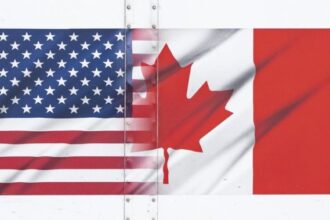US Trade Tensions Impact Canadian Business Growth: Canadian Entrepreneurs Face Mounting Pressure
In Vancouver’s bustling Yaletown district, tech startup founder Maya Thompson stares at her laptop, reviewing the latest impact projections from the US trade dispute. “We planned to expand south this quarter,” she sighs, closing her spreadsheet. “Now we’re in wait-and-see mode.”
Thompson’s situation mirrors thousands across Canada as escalating US trade tensions cast a growing shadow over Canadian business creation. New data from Statistics Canada reveals a troubling trend: business formation has fallen to its lowest point in three years, with a 12% decline in new incorporations compared to pre-pandemic levels.
“We’re witnessing a perfect storm of challenges,” explains Dr. Harjit Singh, economist at the University of British Columbia. “Trade uncertainty combined with rising interest rates has created a risk-averse environment where potential entrepreneurs are hitting pause on their business plans.”
The ripple effects extend beyond boardrooms. In manufacturing hubs like Windsor and Hamilton, supply chain disruptions have forced existing businesses to delay expansion projects. A recent survey by the Canadian Chamber of Commerce found that 64% of manufacturers have postponed capital investments, citing trade unpredictability as their primary concern.
Particularly vulnerable are Canada’s resource sectors, where American tariffs have created market volatility. “We’re price-takers, not price-makers,” says James Morton, CEO of Northern Resources Alliance. “When Washington shifts policy, our entire forecast changes overnight.”
For Canada’s technology sector, once seen as somewhat insulated from traditional trade disputes, the impact has been equally sobering. Venture capital funding for Canadian tech startups fell 31% year-over-year, with investors citing cross-border regulatory uncertainty as a significant factor.
Government response has drawn mixed reviews. The federal government’s $2.1 billion business support package announced last month includes export diversification grants and tax incentives for new business formation. Critics argue these measures address symptoms rather than underlying structural issues in Canada’s business environment.
“Canada needs to fundamentally rethink its approach to business creation,” argues Martha Chen, director of entrepreneurship at the Calgary Innovation Hub. “Rather than just weathering US trade storms, we need to build companies designed for global markets from day one.”
Some bright spots exist amid the challenging landscape. Regions focused on domestic consumption show greater resilience, with food production and healthcare technology experiencing modest growth. Additionally, businesses focused on climate adaptation and sustainability have attracted increased investment despite broader market hesitancy.
For entrepreneurs like Thompson, adaptability has become essential. “We’ve pivoted to focus more on European partnerships while the US situation stabilizes,” she explains. “It wasn’t our original plan, but diversification might ultimately strengthen our business.”
As Canada navigates these troubled economic waters, the fundamental question remains whether current trade tensions represent a temporary disruption or a new normal requiring structural adaptation. The answer will shape Canadian business creation for years to come.
For more business insights, visit CO24 Business or follow our coverage of breaking economic developments at CO24 Breaking News.






















